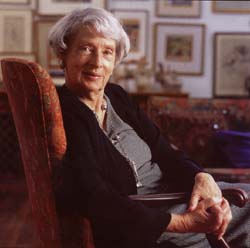 |
 |
| current issue |  |
past issues |  |
send a letter/news |  |
address update |  |
advertise |  |
about us |  |
alumni home |
Features
Building on SuccessUNH's Capital Campaign Looks to the Future
By Meg Torbert and Maggie Paine
Photographs by Frank Clarkson
Asa D. Smith, the first president of the New Hampshire College of Agriculture and the Mechanic Arts, wrote in 1873 that the college's planners "builded better than they knew." And they did, creating an institution that filled a need, as witnessed by an enrollment that grew from 10 students in 1868, the college's first year, to 1,000 in 1922, to over 12,000 today.
But there was also a certain shrewdness evident in the college's beginnings. The federal Morrill Act of 1862 granted large tracts of public land to each state, the sale of which could provide funds for a land-grant college. There was a catch, however: none of the money could be used for buildings—states had to provide their own.
And again, when Benjamin Thompson wrote his will in 1856, leaving his farm to New Hampshire for an agricultural college, he included a requirement that the state appropriate $3,000 annually for 20 years, to be used for equipping the new school. If New Hampshire didn't like the terms of the will, Thompson's estate would go to Massachusetts, or Michigan.
Behind these conditions was an understanding that it would take more than the vision of elected officials or the benevolence of one farmer to make a public college or a university thrive. A successful college would need students and their families to see the value of higher education, and educators who would dedicate their energy and their careers to expanding the minds of young men and women. It would need legislators and taxpayers to realize the importance of educating the state's youth regardless of their ability to afford tuition. And private donors who would see how gifts could benefit the lives of students, in particular, and the furtherance of knowledge in general.
It's this last piece that the University of New Hampshire seeks to address with its first major capital campaign, The Next Horizon. As the campaign begins this fall, the UNH Foundation's staff will be informing UNH alumni and friends how gifts can help students and the University in the future. Just as gifts to the University have opened doors for students and programs in the past.
Help in Hard Times

|
The life of professor emerita of history Marion James '40 is interwoven with the history of the University itself. The daughter of Professor Charles James, an internationally renowned chemist, she was literally born into the University community. Now comfortably retired after a long and distinguished career as a UNH history professor, it might seem as if her future was somehow predestined. But in fact she attended UNH during the Great Depression, a time when many students faced tremendous uncertainty about whether they would return for the next semester, much less graduate.
"King" James—so-called for his British accent—died in 1928, when his daughter was 10 years old. A year later, the stock market crashed, and when Marion James entered UNH in 1936, the country had not yet recovered. Her junior year, she received a $200 scholarship. The money went a long way—tuition in 1939 was $150 for in-state students, and room and board was typically $280. Dr. James recalls, "I was honored, and very glad to get it. It helped."
After UNH, an interest in Far Eastern literature led her to Harvard. With graduate degrees in both English and history, Dr. James substituted for a UNH history professor on sabbatical. The rest, as they say, is history. These days she is active as president of the Durham Historical Society, as an award-winning painter and a world traveler. Afghanistan, which she's visited five times, is especially close to her heart. "I love Afghanistan," she says, and nods her head, pleased. "The people are tough and independent."
Page: 1 2 3 Next >Easy to print version
blog comments powered by Disqus

